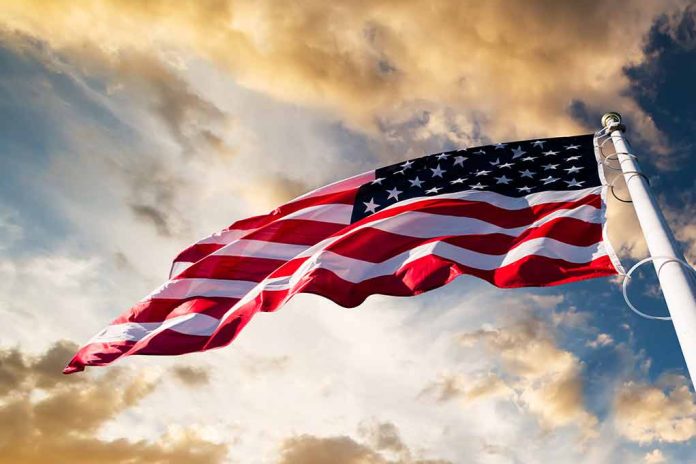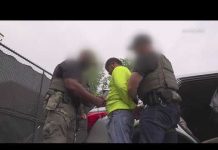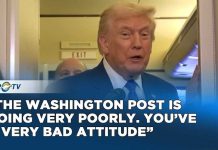
President Trump announced plans to jail flag burners for one year, directly challenging the Supreme Court’s long-standing protection of this controversial form of political expression.
Key Takeaways
- President Trump proposed a one-year jail sentence for anyone who burns the American flag during a speech at Fort Bragg, North Carolina.
- Trump’s proposal directly challenges the Supreme Court’s 1989 Texas v. Johnson ruling that declared flag burning protected speech under the First Amendment.
- The announcement comes amid ongoing anti-ICE protests in Los Angeles, Dallas, and Austin where some demonstrators have burned American flags.
- Trump mentioned working with senators, including Missouri GOP Sen. Josh Hawley, to pass legislation imposing jail time for flag burning.
- Trump has also deployed 4,100 National Guard troops and 700 Marines to protect federal officials during immigration enforcement operations.
Trump Takes Bold Stand Against Flag Burners
President Trump has taken a decisive stand against protesters who burn the American flag, proposing legislation that would impose a one-year jail sentence for such acts. During remarks at Fort Bragg, North Carolina, Trump outlined his plan to work with lawmakers to enact this measure amid escalating anti-ICE protests across major American cities. The President specifically addressed the ongoing demonstrations in Los Angeles, where protesters have been burning American flags while opposing federal immigration enforcement operations.
“People that burn the American flag should go to jail for one year. And we’ll see if we can get that done,” said President Donald Trump during his address at Fort Bragg, underscoring his determination to protect our national symbol from desecration.
Constitutional Challenge and Legislative Strategy
Trump’s proposal represents a direct challenge to the Supreme Court’s 1989 Texas v. Johnson ruling, which established flag burning as protected political expression under the First Amendment. Despite this precedent, the President appears determined to move forward with legislation to criminalize the act. Trump revealed that his administration is actively working with senators, including Missouri GOP Sen. Josh Hawley, to draft and pass a bill that would make flag burning punishable by a mandatory one-year prison sentence.
“People that burn the American flag should go to jail for one year … we’re working with some of your senators. And we’ll see if we can get that done, we’re going to try and get that done. We’re working with some of your senators — I know Missouri GOP Sen. Josh Hawley is very much involved,” said President Donald Trump, demonstrating his commitment to protecting our national symbol through legislative action.
The President’s proposal interestingly echoes positions previously held by some prominent Democrats. Both Joe Biden and Hillary Clinton have historically supported punitive measures against flag burning, though their stances have evolved over time. This highlights how the issue transcends typical partisan divisions, touching on fundamental questions about patriotism and the limits of protected speech.
Confronting Anti-ICE Protests Nationwide
Trump’s announcement comes amid escalating protests against Immigration and Customs Enforcement (ICE) operations in several major cities. In Los Angeles, where demonstrations have entered their fifth day, protesters have engaged in flag burning, car burnings, and clashes with law enforcement. The President has responded by deploying 4,100 National Guard troops and 700 Marines to protect federal officials and property during immigration enforcement operations, a move that California Governor Gavin Newsom has vocally opposed.
“They proudly carry flags of other countries, but they don’t carry the American flag. They only burn it,” said President Donald Trump, highlighting the contrast between protesters’ treatment of foreign flags versus the American flag during the ongoing demonstrations.
Similar protests have erupted in Dallas, where one arrest was reported after demonstrators clashed with police, and in Austin, where 12 individuals were arrested for defacing a federal building with graffiti. In New York City, over 80 people were arrested during chaotic anti-ICE demonstrations. These nationwide protests follow the Department of Homeland Security’s report that 118 illegal migrants were arrested in a recent deportation sweep, part of Trump’s renewed focus on immigration enforcement.
Tension with California Leadership
The President’s relationship with California Governor Gavin Newsom has deteriorated amid these enforcement actions, with Trump suggesting that Newsom could potentially face charges for his handling of the riots and alleged obstruction of ICE operations in Los Angeles. Newsom’s administration has responded by filing a lawsuit against Trump, claiming violations of California’s 10th Amendment rights, and the governor has even challenged Trump’s border czar, Tom Homan, to arrest him over the dispute.
“In theory, you could,” said Trump regarding the possibility of charging Governor Newsom for his handling of the riots, highlighting the growing tension between federal immigration enforcement priorities and California’s sanctuary policies.
As the administration continues its immigration enforcement actions, the proposed flag burning legislation represents another front in Trump’s broader efforts to assert the rule of law and respect for national symbols. While critics will likely raise First Amendment concerns, the President’s proposal resonates with many Americans who view flag burning as deeply offensive and unpatriotic, especially when conducted as part of protests against federal law enforcement activities.














